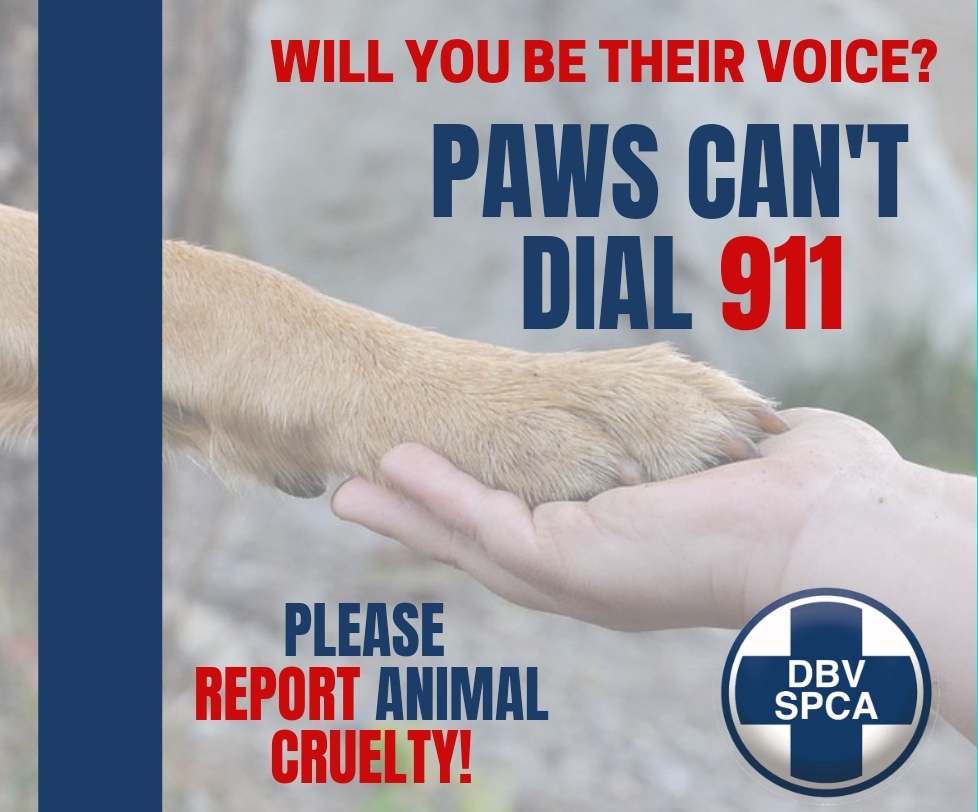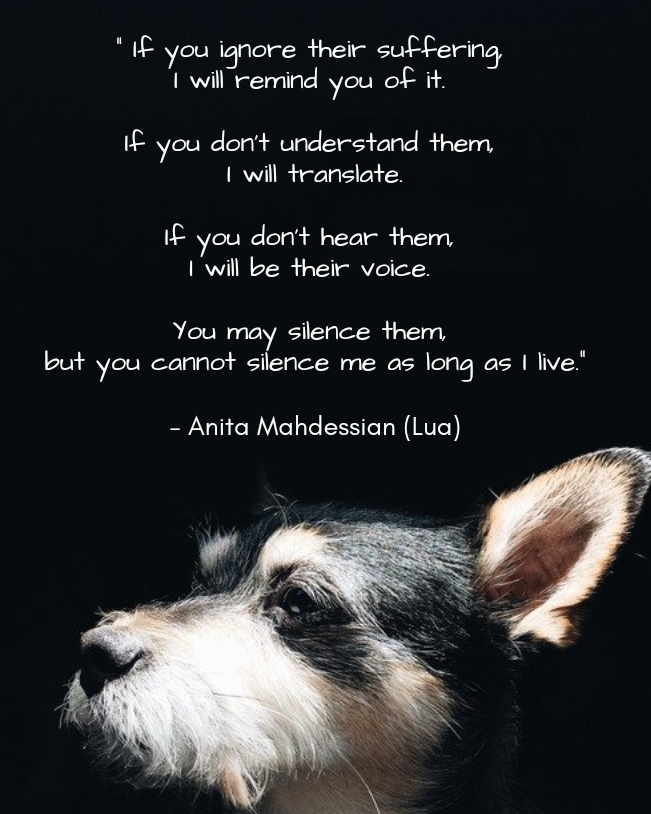
ANIMALS 101 – WHEN YOU BETTER UNDERSTAND CRUELTY, YOU CAN JOIN THE FIGHT AGAINST IT MORE EFFECTIVELY!
In the previous two weeks, we looked at how to better understand cruelty and recognize the signs of cruelty. This week we will look at how you can help us fight cruelty against animals.

Pets have no voice to cry out for help. They aren’t able to alert authorities to abuse, and they can’t quietly discuss their pain and injuries with a veterinarian. You have to be the eyes and ears for the animals you encounter to ensure that if there is any abuse, it can be stopped in time. If you do not report cruelty, then you are complicit.
As we mentioned last week, neglect may require an educational visit from an SPCA inspector or animal welfare worker. Abuse may require the removal of the animal from the home and prosecuting the offenders. Either way, your call will guarantee a better life for that animal.
REPORTING CRUELTY
ALWAYS REPORT CRUELTY! If you notice an animal that appears to be suffering, call your local animal welfare agency (mainly the SPCA in SA) immediately! Do not send a message or email nor report this through social media as we lose precious time! Call their emergency number until they answer! It can always be done anonymous and even if you are unsure, rather report so the SPCA or animal welfare can investigate.
Save your local SPCA office and emergency numbers on your phone. Also include the numbers of the areas where your friends or family stay or where you visit frequently.
HOW TO REPORT
- Is it safe to take a photo/video?
- Get an exact address or pin drop.
- Call your local SPCA. Find them via the NSPCA website www.nspca.co.za
- Assist with the case.

HELP US FIGHT CRUELTY!
- Report cruelty!
- Be a responsible pet owner. Know about and fulfill the needs of your pet. Don’t just concern yourself with basic needs – give your pet positive experiences that really enhance its well-being. It is a lifetime commitment, not just when it suits you.
- Be an example of kindness to other pets. Foster a pet that has suffered abandonment. Sadly, many pets are relinquished to shelters for various reasons. Foster homes help these animals to recover and prepare them to move on to a new permanent loving home. If you can, ADOPT!
- Intervene if you witness animal cruelty, abuse or neglect. Do what you can to stop someone from mistreating an animal. However, be sensible and if necessary, seek help from other witnesses. An animal that has been mistreated needs support, sometimes immediately. You can make a real difference by taking an animal out of a harmful situation.
- You can keep food, water and a blanket in your car. If you see an animal in need or roaming around you can help. Approach only if it is safe for both you and the animal, as we do not want them to run away into danger. If the animal is hurt, stay with them or follow them at a safe distance, while you wait for your local animal welfare organisations to come and assist you. If you can pick up the animal, take them to your Vet, the SPCA, or into your yard until the owners are found.
- Teach your children to have respect for animals. Set a good example by being respectful towards animals. Show children how to interact with and treat animals with love and consideration. Even if you pet allows it, kids should not be sitting on or pulling on the ears or tails etc. of pets. Help them to grow up to become the next generation of advocates for animals. Children who are cruel to animals often grow up to be cruel to people as well. Nip animal cruelty in the bud early on.
- Know the legislation & support legislation that promotes kindness to animals. Stronger animal welfare laws and harsher penalties for abusers will lead to fewer cruelty cases. Support the campaigns and advocate for animal rights! Ask what animal welfare policies the political party you support has. You can read the Prevention of Cruelty to Animals Act, 1993 (Act 169).
- Animal and social welfare link. Consider that neglect of animals can be closely linked to domestic violence. Animal abuse usually precedes or is concurrent with other abuse. By reporting your suspicions, you may also be helping both the animal in need and the family concerned.
- Educate people around you about the issue. Help people to understand that they can intervene in situations where animals are being neglected or even tormented. Animals have a right to live without fear or pain, and we have a responsibility to step in if their rights aren’t respected. Promote programs at schools! You can read more on specific educational animal welfare topics on the NSPCA website www.nspca.co.za
- Offer help to people who seem overwhelmed with their animals. Animals aren’t necessarily neglected out of a lack of love. An owner may not have the psychological resources to provide an animal with the appropriate care. Whatever the reasons may be, an affected pet must be removed from a place of neglect and given the care it needs to live and thrive. Any help you give to an animal may help a human too.
- Volunteer in animal welfare, whether it is by fostering, helping at kennels, sharing posts, or by donating to those that do the work. Take care of those animal welfare workers in the trenches, so they can continue this sad and tough job. Whether it is words of encouragement, a gift, treatment, or just a coffee.
- Using cruelty-free products like skin/body/hair/make-up. The www.humaneguide.co.za are products endorsed by Beauty without Cruelty (South Africa) that do not test on or pay for testing on animals. Don’t be fooled by companies’ smart and sly slogans. It is never what the company claims, but what they can prove! Be informed!

Preventing animal cruelty is no easy task, but with your help, we CAN DO THIS!
Next week we will look at how to choose pets for your kids.
WHEN YOU KNOW BETTER, DO BETTER!